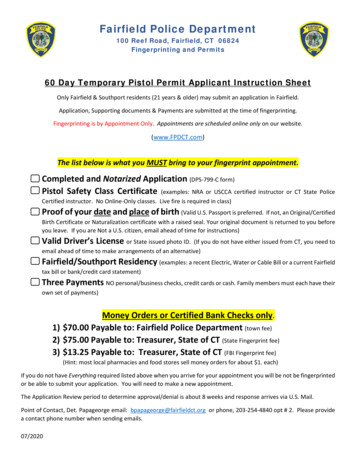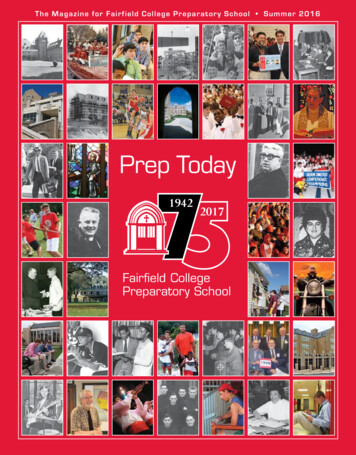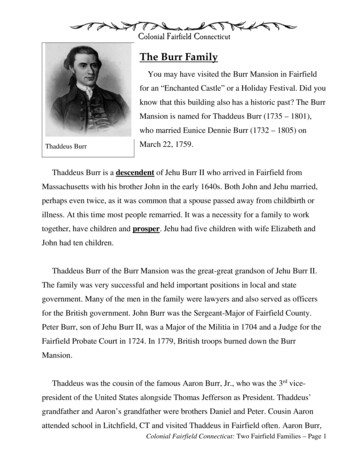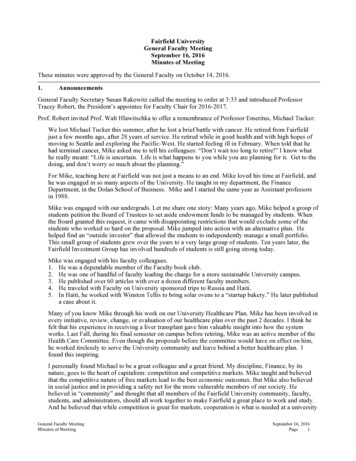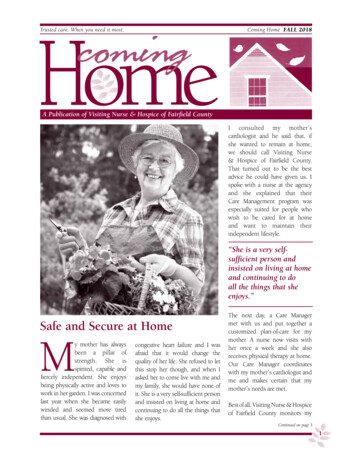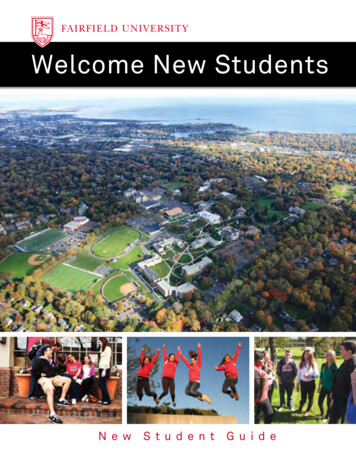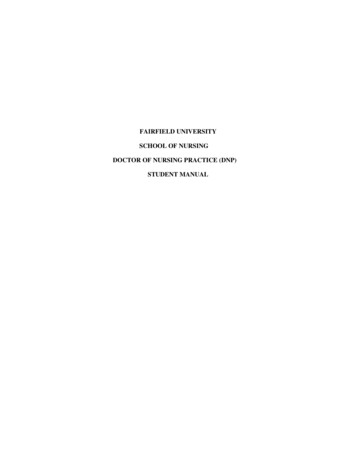
Transcription
FAIRFIELD UNIVERSITYSCHOOL OF NURSINGDOCTOR OF NURSING PRACTICE (DNP)STUDENT MANUAL
Dear Incoming DNP students,I am delighted to welcome you to the Doctor of Nursing Practice program at Fairfield University. As acurrent student, I can tell you from firsthand experience what an exciting time this will be in yourprofessional life and career. Pursuing my doctorate in nursing has been a very rewarding experience for me.One aspect of the program that I have really enjoyed is the professional collaboration among peers. This isextremely valuable to the learning experience. I encourage you to reach out to your fellow students andcreate a sense of community, look to each other for support while embracing each other’s differences andtake full advantage of all that the school has to offer. The professors are extremely approachable, helpfulwith advice and guidance, and want their students to succeed.A significant portion of this program is focused on the DNP Immersion. Begin early to think about choosingand developing your topic of interest for the Immersion. I encourage you to think globally and stretchyourself professionally as you decide on your research area. Reflection is an integral component of FairfieldUniversity’s mission and I encourage you to use this in all aspects of your time here at Fairfield.I hope you will have a rewarding and successful academic year. Congratulations on making a positive choicein pursuing an advanced degree in nursing. It is an exciting time for both you and the nursing profession.Best,Priscilla P. Sterne, MSN, RNC2
TABLE OF CONTENTSINTRODUCTIONMission & PurposeGuiding Principles for the Undergraduate and Graduate ProgramsEthics and Social ResponsibilityHolismReflective PracticeProfessionalismDNP Program OutcomesCurriculum PlansFamily Nurse Practitioner Part-time PlanFamily Nurse Practitioner Full-time PlanPsychiatric Nurse Practitioner Part-time PlanPsychiatric Nurse Practitioner Full-time PlanMSN-DNPNurse AnesthesiaSigma Theta TauGraduate Student AssemblyIMPORTANT THINGS TO KNOWAcademic AttireAcademic & Disability Support ServicesBookstoreCampus MinistryCareer Planning CenterCounseling & Psychological ServicesComputer LabsDining ServicesEmailFinancial AidOther SourcesGraduate Nursing Conference RoomGraduate Student LifeHonor CodeLibraryMailroomOrientationParking3
Public SafetyRegistrationStag Card OfficeStudent Diversity ProgramsDNP IMMERSIONClearance for Practice/DNP ImmersionRequirementsResumePractice/DNP Immersion Placement FormDNP Immersion Clinical Log/Student Learning ObjectivesImmersion PoliciesDNP Immersion Roles for Faculty and Agency PreceptorsDNP Immersion Experience GuidelinesCLINICAL PORTFOLIOContents of Clinical PortfolioDigitation Requirements for Clinical PortfolioFaculty Expertise for DNP Mentoring4
INTRODUCTIONThe philosophy of the School of Nursing flows from the mission statement of Fairfield University, and givesdefinition to the Jesuit ideals of social responsibility, truth, and justice. The faculty views nursing as the artand science of reflective practice in caring for vulnerable populations. Individuals are biological,psychological, social, and spiritual beings who are unique members of families and of larger social systems.Interaction and communication within these systems influence health and well-being. Health is a dynamicprocess of physical, mental, spiritual, and environmental harmony that enables people to affirm and pursuetheir own life goals. Optimum health begins with nurturing and promoting one's own emotional and spiritualgrowth, which then extends to respect and caring for others. Health and well-being are influenced by manyvariables including quality of life. When recovery from illness is not possible, death itself is viewed as thefinal opportunity for growth.Students are viewed as holistic individuals who are seeking to develop in multifaceted roles and who areaccountable for their learning. Each student brings unique qualities that contribute to the strength anddiversity of the program. Along with planned educational experiences, faculty offer support, guidance, andmentoring throughout the learning process. Students are encouraged to develop their individual strengths andidentify areas of interest as they progress throughout the curriculum. Students emerge as qualifiedbaccalaureate-prepared entry-level practitioners or master's/doctorally prepared advanced-level practitioners,who integrate theory and research into their practices and use a critical approach to problem solving. Becausesociety is rich with diverse religious, ethnic, and cultural groups, nurses are professionals who must beprepared to work with those whose beliefs and values may be different from their own. In order to besensitive to others, it is first necessary to know and accept one's own values and beliefs. Students and facultydemonstrate mutual respect for the rights of others and appreciation of these differences.Mission & PurposeIn keeping with the mission of Fairfield University to develop men and women for others, the School ofNursing builds on a tradition of innovation and a commitment to provide the very best nursing education,scholarship and professional service locally, nationally, and internationally. The School of Nursing iscommitted to leadership in nursing. The discovery, transmission, and use of knowledge are at the core of ourwork. Knowledge of health and illness in individuals, families, groups and communities, both locally andinternationally, provides the context for our charge. The ultimate test of our vision will be the results ofcontributions of faculty and graduates over time.Guiding Principles for the Undergraduate and Graduate ProgramsEthics and Social ResponsibilityCommitment to social responsibility, truth, and justice is inherent in the Jesuit ideal and underscores the needto provide care to vulnerable populations; that is, those populations that experience actual or potential threatsto health or well-being. Provision of care to vulnerable populations is a particular concern to nursing. Nurseshave a moral and ethical obligation to provide and advocate for optimal healthcare for all members of societyregardless of differences in culture, race, gender, socioeconomic status, religion, and age. Nurses considerthe interplay of health and social issues as they care for clients in various stages of health and illness.Students confront the range of ethical dilemmas and value conflicts inherent in care delivery, and develop anunderstanding and acceptance of self and others.5
HolismHuman beings are unique individuals who grow in complexity throughout life. Holism is an approach toassessment and management of patient-centered care that considers the biological, psychological,sociocultural, and spiritual needs of patients, and searches for the deeper and more complex roots of ill healthbeyond the individual. Interactions among people and between people and the environments in which theylive are considered in planning and providing quality nursing care. The holistic approach supports and reliesupon the therapeutic nurse-patient relationship and a focus on wholeness, harmony and healing.Reflective PracticeNurses diagnose human responses to actual and potential health problems, identify individual strengths andnursing care needs, and plan and deliver culturally sensitive care that promotes, maintains or restores health.Nursing practice integrates scientific problem solving with holistic caring. Reflective practice emphasizes acombination of rational and intuitive processes that allow students to discover the links between theory andpractice help them to develop their skills in creating holistic, individualized, and flexible plans of care, andenhance their acceptance of professional responsibility. It incorporates approaches such as reflection-onaction, reflection-in-action, and reflection-before-action. Reflective practice leads to greater awareness ofindividual beliefs, biases, and existing knowledge base, development of creative and critical thinkingprocesses, changes in perspectives, attitudes, and behaviors, and enhanced personal and professional identitydevelopment. The establishment of a pattern of reflective practice encourages lifelong learning andultimately advances the discipline of nursing through greater knowledge production and opportunities forleadership.ProfessionalismCharacteristics of professional nursing practice include critical thinking, clinical reasoning, decision-making,and accountability. Behaviors integral to professional nursing’s role are advocacy, political activism,effective communication, collegiality, commitment to life-long learning, scholarship, and the upholding ofstandards as defined by the profession. Nurses are integral members of interprofessional teams andcollaborate with other healthcare providers, patients, family and community members; their role involvesresponsibilities for teaching, making referrals, and strategizing to shape health policy at local, state, national,and international levels. The purpose of this collaborative, interprofessional activity is to improve care andaddress quality and safety issues through education, consultation, and management. Professional nursingpractice combines holistic care with evidence-based practice. Nursing research is viewed as the investigationof issues of concern in nursing practice with the aim of answering complex questions and developingknowledge to improve care and potentiate health. Leadership and management skills are essential to shapethe future of healthcare, and help others attain goals and facilitate change. Participation in professionalorganizations and groups, role modeling, patient advocacy, political activism, and fostering a learningenvironment by mentoring others is expected.6
DNP Program Outcomes1. Independently provide culturally sensitive and evidence-based care to individuals and populations ina defined area of advanced nursing practice.2. Demonstrate critical thinking at the highest level of practice and accountability in the management ofhealthcare systems, considering ethical, legal, and socially just patient-centered care.3. Translate research into practice through critique of existing evidence, evaluation of outcomes, andimplementation of projects that contribute to the development of best practices.4. Integrate science and theory from nursing and related disciplines within a reflective practiceframework to inform clinical judgments, resolve dilemmas in healthcare, and serve as a patient careadvocate.5. Evaluate patient, population, and healthcare system outcomes using fiscal analysis and costeffective strategies to achieve quality improvement.6. Analyze the use of healthcare information systems and patient care technology to assure qualityhealthcare outcomes.7. Lead collaborative interprofessional relationships and partnerships to transform healthcare deliverysystems and improve health.8. Assume a leadership role in the analysis, development, implementation, and evaluation of policies toimprove healthcare delivery and outcomes at the local, regional, national, and international levels.7
Curriculum PlansFAMILY NURSE PRACTITIONER TRACK - BSN-DNP (PART TIME)YEAR #1Fall Semester (6 credits)NS 610 Advanced Nursing Roles & Reflective Practice (3)NS 640 Advanced Physiology & Pathophysiology (3)Spring Semester (7 credits)NS 604 Advanced Health Assessment (4)NS 608 Application of Nursing Theory & Research Methods to Practice (3)[Pre-/Co-req: NS 601]Summer Term (6 credits)NS 611 Clinical Prevention & Strategies for Change (3)NS 641 Advanced Pharmacology (3) [Prereq: NS 640]YEAR #2Fall Semester (6 credits)NS 614 Information Technology for Healthcare Improvement (3)NS 642 Adult Health I (3)[Prereqs: NS 604, NS 640, NS 641]Spring Semester (7 credits)NS 601 Epidemiology and Biostatistics (3)NS 643 Adult Health II (4) [Prereq: NS 642]Summer Term (4 credits)NS 644 Practicum in Adult Health I (4) [Prereq: NS 643]YEAR #3Fall Semester (7 credits)NS 645 Care of Children & Families (3)[Prereq: NS 643; Co-Req: NS 646]NS 646 Practicum in Care of Women, Children & Families (4)[Prereq: NS 644; Co-Req: NS 645]8
FAMILY NURSE PRACTITIONER TRACK - BSN-DNP (PART TIME)Spring Semester (8 credits)NS 615 Leadership & Interprofessional Collaboration (3)NS 612 Research Translation for Clinical Practice (3)[Prereq: NS 608]NS 687 DNP Immersion* (2-5)Summer Term (5 credits)NS 605 Advanced Healthcare Policy (3)NS 687 DNP Immersion* (2-5)YEAR #4Fall Semester (8 credits)NS 613 Finance & Quality Management in Healthcare Organizations (3)NS 687 DNP Immersion* (2-5)NS 699 DNP Seminar† (1)Spring Semester (8 credits)NS 647 Care of At-Risk Populations (3)[Prereq: NS 645; Co-Req: NS 648]NS 648 Practicum in Care of At-Risk Populations (4)[Pre-/Co-Req: NS 647]NS 699 DNP Seminar† (1)Total Credits: 72*A total of 1,000 practicum/immersion hours are required for the DNP (1 credit 50 hours).†In the final two semesters of the curriculum plan, students must register for 1-credit of DNP Seminaradvisement. Students who have not completed their portfolios must continue to register for 1-creditadvisement each semester until completion.9
FAMILY NURSE PRACTITIONER TRACK - BSN-DNP (FULL TIME)YEAR #1Fall Semester (9 credits)NS 605 Advanced Healthcare Policy (3)NS 610 Advanced Nursing Roles & Reflective Practice (3)NS 640 Advanced Physiology & Pathophysiology (3)Spring Semester (10 credits)NS 601 Epidemiology and Biostatistics (3)NS 604 Advanced Health Assessment (4)NS 608 Application of Nursing Theory & Research Methods to Practice (3)Summer Term (6 credits)NS 611 Clinical Prevention & Strategies for Change (3)NS 641 Advanced Pharmacology (3) [Prereq: NS 640]YEAR #2Fall Semester (9 credits)NS 613 Finance & Quality Management in Healthcare Organizations (3)NS 614 Information Technology for Healthcare Improvement (3)NS 642 Adult Health I (3) [Prereqs: NS 604, NS 640, and NS 641]Spring Semester (10 credits)NS 612 Research Translation for Clinical Practice (3)NS 615 Leadership & Interprofessional Collaboration (3)NS 643 Adult Health II (4) [Prereq: NS 642]Summer Term (6 credits)NS 644 Practicum in Adult Health I (4) [Prereq: NS 643]NS 687 DNP Immersion (2)10
FAMILY NURSE PRACTITIONER TRACK - BSN-DNP (FULL TIME)YEAR #3Fall Semester (11 credits)NS 645 Care of Children & Families (3) [Prereq: NS 644; Co-Req: NS 646]NS 646 Practicum in Care of Women, Children & Families (4)[Prereq: NS 644; Co-Req: NS 645]NS 687 DNP Immersion (3)NS 699 DNP Seminar† (1)Spring Semester (11 credits)NS 647 Care of At-Risk Populations (3) [Prereq: NS 645; Co-Req: NS 648]NS 648 Practicum in Care of At-Risk Populations (4) [Pre-/Co-Req: NS 647]NS 687 DNP Immersion* (3)NS 699 Practice Dissertation† (1)Total Credits: 72*A total of 1,000 practicum/immersion hours are required for the DNP (1 credit 50 hours)†In the final two semesters of the curriculum plan, students must register for 1-credit of DNP Seminaradvisement. Students who have not completed their portfolios must continue to register for 1-creditadvisement each semester until completion.11
PSYCHIATRIC NURSE PRACTITIONER TRACK - BSN to DNP (PART TIME)YEAR #1Fall Semester (6 credits)NS 610 Advanced Nursing Roles & Reflective Practice (3)NS 640 Advanced Physiology & Pathophysiology (3)Spring Semester (7 credits)NS 604 Advanced Health Assessment (4)NS 608 Application of Nursing Theory & Research Methods to Practice (3)Summer Term (6 credits)NS 611 Clinical Prevention & Strategies for Change (3)NS 641 Advanced Pharmacology (3) [Prereq: NS 640]YEAR #2Fall Semester (6 credits)NS 614 Information Technology for Healthcare Improvement (3)NS 650 Psychopathology (3)Spring Semester (6 credits)NS 601 Epidemiology and Biostatistics (3)CN 455 Group Work Theories and Practice (3) [Prereq: NS 650]Summer Term (7 Credits)NS 652 Mental Health Nursing of Individuals Across the Lifespan(3)[Prereqs: NS 604, NS 608, NS 610, NS 640, NS 641, NS 650, CN 455]NS 660 Practicum I: PMHNP (4) [Pre/Co-Req: NS 652]Year #3Fall Semester (7 Credits)NS 661 Mental Health Nursing of Groups and Families Across the Lifespan (3)[Prereq: NS 652; Co-Req: NS 662]NS 662 Practicum II: PMHNP (4)[Prereq: NS 660; Pre-/Co-Req: NS 661]12
PSYCHIATRIC NURSE PRACTITIONER TRACK - BSN to DNP (PART TIME)Year #3 (continued)Spring Semester (8 credits)NS 612 Research Translation for Clinical Practice (3)[Prereq: NS 608]NS 615 Leadership & Interprofessional Collaboration (3)NS 687 DNP Immersion* (2-5)Summer Term (5 credits)NS 605 Advanced Healthcare Policy (3)NS 687 DNP Immersion* (2-5)YEAR #4Fall Semester (8 credits)NS 613 Finance & Quality Management in Healthcare Organizations (3)NS 687 DNP Immersion* (2-5)NS 699 DNP Seminar† (1)Spring Semester (8 credits)NS 663 Primary Mental Health Nursing of At-Risk Populations Across the Lifespan (3)[Prereq: NS 661; Co-Req: NS 664]NS 664 Practicum III: PMHNP (4)[Prereq: NS 662; Co-Req: NS 663]NS 699 DNP Seminar† (1)Total Credits: 74*A total of 1,000 practicum/immersion hours are required for the DNP (1 credit 50 hours).†In the final two semesters of the curriculum plan, students must register for 1-credit of DNP Seminaradvisement. Students who have not completed their portfolios must continue to register for 1-creditadvisement each semester until completion.13
PSYCHIATRIC NURSE PRACTITIONER TRACK - BSN to DNP (FULL TIME)YEAR #1Fall Semester (9 credits)NS 605 Advanced Healthcare Policy (3)NS 610 Advanced Nursing Roles & Reflective Practice (3)NS 640 Advanced Physiology & Pathophysiology (3)Spring Semester (10 credits)NS 601 Epidemiology and Biostatistics (3)NS 604 Advanced Health Assessment (4)NS 608 Application of Nursing Theory & Research Methods to Practice (3)Summer Term (9 credits)NS 611 Clinical Prevention & Strategies for Change (3)NS 612 Research Translation for Clinical Practice (3)[Prereq: NS 608]NS 641 Advanced Pharmacology (3) [Prereq: NS 640]YEAR #2Fall Semester (9 credits)NS 613 Finance & Quality Management in Healthcare Organizations (3)NS 614 Information Technology for Healthcare Improvement (3)NS 650 Psychopathology (3)Spring Semester (8 credits)NS 615 Leadership & Interprofessional Collaboration (3)NS 687 DNP Immersion* (2-5)CN 455 Group Work Theories and Practice (3) [Prereq: NS 650]Summer Term (9 Credits)NS 652 Mental Health Nursing of Individuals Across the Lifespan (3)[Prereqs: NS 604, NS 608, NS 610, NS 640, NS 641, NS 650 and CN 455]14
PSYCHIATRIC NURSE PRACTITIONER TRACK - BSN to DNP (FULL TIME)Summer Term (continued)NS 660 Practicum I: PMHNP (4)[Pre-/Co-Req: NS 652]NS 687 DNP Immersion* (2-5)Year #3Fall Semester (8 Credits)NS 661 Mental Health Nursing of Groups and Families Across the Lifespan (3)[Prereq: NS 652; Co-Req: NS 662]NS 662 Practicum II: PMHNP (4)[Prereq: NS 660; Pre-/Co-Req: NS 661]NS 699 DNP Seminar† (1)Spring Semester (12 credits)NS 663 Primary Mental Health Nursing of At-Risk Populations Across the Lifespan(3)[Prereq: NS 661; Co-Req: NS 664]NS 664 Practicum III: PMHNP (4)[Prereq: NS 662; Co-Req: NS 663]NS 687 DNP Immersion* (2-5)NS 699 DNP Seminar† (1)Total Credits: 74*A total of 1,000 practicum/immersion hours are required for the DNP (1 credit 50 hours)†In the final two semesters of the curriculum plan, students must register for 1-credit of DNP Seminaradvisement. Students who have not completed their portfolio must continue to register for 1-creditadvisement each semester until completion.15
MSN to DNPYEAR #1Fall Semester (7 credits)NS 608 Application of Nursing Theory & Research Methods to Practice (3)NS 609 Role Reflective Practice for MSN-DNP Students (1)NS 613 Finance & Quality Management in Healthcare Organizations (3)Spring Semester (6 credits)NS 601 Epidemiology & Biostatistics (3)NS 615 Leadership & Interprofessional Collaboration (3)Summer Term (8-10 credits)NS 611 Clinical Prevention & Strategies for Change (3)NS 612 Research Translation for Clinical Practice (3)NS 687 DNP Immersion* (2-5)YEAR #2Fall Semester (6-8 credits)NS 614 Information Technology for Healthcare Improvement (3)NS 687 DNP Immersion* (2-5)NS 699 DNP Seminar† (1)Spring Semester (5-8 credits)NS 687 DNP Immersion* (2-5)NS 699 DNP Seminar† (1)Total Credits: 33-39*A total of 1,000 practicum/immersion hours are required for the DNP (1 credit 50 hours). For MSN toDNP students, these hours include documented hours of supervision in an MSN program and may varyaccordingly. Additional semesters may be needed depending on the number of immersion hours needed.16
CURRICULUM PLAN - NURSE ANESTHESIA TRACK - DNPYEAR #1Summer Term (9 credits)NS 605Advanced Healthcare Policy (3)NSAN 670 Human Anatomy & Physiology for Nurse Anesthetists (3)NSAN 673 Chemistry & Physics for Nurse Anesthetists (3)Fall Semester (9 credits)NS 610Advanced Nursing Roles & Reflective Practice (3)NS 614Information Technology for Healthcare Improvement (3)NSAN 671 Pharmacologic Strategies in Anesthesia Practice (3)Spring Semester (13 credits)NS 601Epidemiology and Biostatistics (3)NS 604Advanced Health Assessment (4)NS 608Application of Nursing Theory & Research Methods to Practice (3)[Pre-/Co-Req: NS 601]NSAN 672 Basic Principles of Nurse Anesthesia Practice (3)YEAR #2Summer Term (7 credits)NS 611Clinical Prevention & Strategies for Change (3)NSAN 674 Advanced Principles of Nurse Anesthesia Practice (3)NSAN 675 Clinical Orientation/Specialty Rotations (1)Fall Semester (7 credits)NS 613Finance & Quality Management in Healthcare Organizations (3)NS 640Advanced Physiology & Pathophysiology (3)NSAN 676 Clinical Practicum I (1)NS 687DNP Immersion (1)17
CURRICULUM PLAN - NURSE ANESTHESIA TRACK - DNPSpring Semester (7 credits)NS 612Research Translation for Clinical Practice (3)[Prereq: NS 608]NS 615Leadership & Interprofessional Collaboration (3)NSAN 677 Clinical Practicum II (1)NS 687DNP Immersion (1)YEAR #3Summer Term (8 credits)NS 641Advanced Pharmacology (3) [Prereq: NS 640]NS 687DNP Immersion* (2-5)NSAN 679 Clinical Correlation Conference I (1)NSAN 680 Clinical Practicum III (2)Fall Semester (6 credits)NS 699DNP Seminar† (1)NSAN 681 Clinical Correlation Conference II (1)NSAN 682 Clinical Practicum IV (2)NSAN 690 Nurse Anesthesia DNP Immersion* (2)Spring Semester (9 Credits)NSAN 683 Clinical Correlation Conference III (2)NSAN 685 Clinical Practicum V (2)NSAN 690 Nurse Anesthesia DNP Immersion* (2)NSAN 697 Nurse Anesthesia Practice Dissertation† (1)Total Credits: 75*A minimum of 1,200 practicum/immersion hours are required for the DNP.†In the final two semesters of the curriculum plan, students must register for 1-credit of DNP Seminaradvisement. Students who have not completed their dissertation must continue to register for 1-creditadvisement each semester until completion.18
Sigma Theta TauSigma Theta Tau is the only international honor society in nursing. The Mu Chi chapter was established atFairfield University in 1991 to recognize superior achievement, leadership, high professional standards,creative work, and commitment to the high ideals of the nursing profession among nursing students.Research grants, conferences, publications, films, exhibits, and awards are extended nationally by SigmaTheta Tau. At Fairfield University, membership is an honor conferred on students by invitation, following acommittee review of qualifications.Graduate candidates must:have completed one-fourth of the nursing curriculum by the end of the Spring semester;have achieved an overall grade point average of at least 3.5 at the end of the Spring semester.Students who meet these academic qualifications should apply when they have completed the aboverequirements. The counselors of the Mu Chi Chapter, faculty members of the School of Nursing, will providecandidates with additional information and an application.Graduate Student AssemblyThe Graduate Student Assembly is an advisory board of graduate students from each program, working toassist and advocate for the graduate student experience and the Jesuit character of our programs. Thegraduate student assembly acts as the liaison between the graduate student body and the Universityadministration. For more information contact the Office of Graduate Student Life, BCC 408H, and Phone:(203) 254-4000, ext. 2747; Email: gradstudentlife@fairfield.edu19
IMPORTANT THINGS TO KNOWAcademic Attire (caps & gowns)Graduate and DNP students will order academic attire (caps and gowns) through the University Registrar.When students complete the application for commencement, they will indicate the degree and themeasurements for the academic attire.Academic & Disability Support ServicesAloysius P. Kelley, S.J. Center(203) 254-4000, ext. 2445www.fairfield.edu/student/adss about.htmlThe Office of Academic & Disability Support Services provides support services to help all students achieveacademic success. Students can take advantage of Peer Tutoring, and they may receive individualizedassistance in many skill areas necessary for academic achievement.BookstoreFairfield University BookstoreBarone Campus Center, 2nd Floor(203) 254-4262www.fairfield.bkstr.comFairfield University Bookstore (Opening October 2011)1499 Post Road http://www.fairfield.edu/press/pr index.html?id 3148Fairfield, CT 06824The Fairfield University Bookstore provides all the required textbooks, course packs, and other materialsnecessary for students and professors. In addition, the bookstore carries a wide variety and selection ofapparel and other gifts. The bookstore also offers snacks and beverages, as well as personal care items.Students in the graduate and DNP program may purchase course textbooks and necessary software (SPSS) atthe bookstore.Campus MinistryEgan Chapel of St. Ignatius LoyolaPedro Arrupe, S.J. Campus Ministry Center(203) 254-4000, ext. 3405www.fairfield.edu/student/cm about.htmlThe Office of Campus Ministry nourishes a faith community on campus, expressing the University's Catholicand Jesuit mission and identity. The Campus Ministry team consists of both religious and lay people, one ofwhom is on call 24 hours a day, and a part-time Protestant chaplain. In addition, the chapel and campusministry center are available to individuals of all faiths and religious traditions.20
Campus Ministry provides counseling and spiritual direction for all students and members of the Universitycommunity, fosters prayer life, conducts retreats and liturgies, trains students as lectors and Eucharisticministers, and coordinates interfaith and ecumenical events. Most community service at the University iseither sponsored by or coordinated through Campus Ministry. While mostly performed by undergraduatestudents, all students are invited to participate in community service activities. In addition to local serviceopportunities, students may apply for longer, immersion experiences to places such as Ecuador, Mexico,Haiti, and Nicaragua, as well as places closer to home such as Kentucky, Maine, and Connecticut. Each year,hundreds of students participate in programs sponsored by Campus Ministry.Career Planning CenterAloysius P. Kelley, S.J. Center(203) 254-4081www.fairfield.edu/student/cpc about.htmlThe Career Planning Center is an excellent resource for students, alumni, and employers at all stages of thecareer planning process. The center provides a variety of workshops on choosing career paths, preparing forand implementing a job search, and a Career Fair to students and alumni. Also, the Career Planning Center isa connection for outside employers to Fairfield University students.Counseling & Psychological ServicesJohn C. Dolan Hall, room 120(203) 254-4000, ext. 2146http://www.fairfield.edu/student/cps about.htmlCollege is a very challenging time. Counseling Services is focused on working with students as they faceconcerns and struggles. Along with wellness and prevention programming, students have the opportunity todevelop healthy lifestyles.Computer LabsBannow 124, Donnarumma 149, Dolan School of Business 1100, 1101 and NYS 115, NYS 250 the CyberCafé and Info Commons.Public computer labs are available in Jazzman’s Café located in the Barone Campus center.Dining ServicesBarone Campus Center, room 400(203) 254-4055www.fairfielddiningservices.comDining Services is managed by Sodexho and includes cafeteria style dining the Barone Campus Center,Canisius Hall snack bar, Jazzman's Cafe, the Stag (Rob & Iggy's, SkyRanch Grill, and the Deli), and cateringservices on campus. Mike's Pizza, which operates in the Levee, is independently owned and managed.Dining Services offers something for everyone.21
EmailA representative from the Computer center will be present at orientation to set up your stagweb emailaccounts. All information regarding courses and your educational experience will be shared via yourstagweb email accounts. Thus, students are encouraged to check these accounts daily or forward stagwebemail to an account that is regularly monitored.Financial AidIf you need financial aid, please contact the Financial Aid office: call (203) 254-4000, x4125 or email:finaid@fairfield.edu. A representative from the financial aid office will be available during orientation.Students may also explore financial aid, scholarship and grant opportunities on their own.http://www.fairfield.edu/gradadmission/gfa index.html. As a prospective Fairfield University student, youare considering an outstanding, private Jesuit institution. The value of this investment – both academicallyand personally – will not only be realized over the years you spend studying, but in the years beyond whenyou are enjoying a successful career and an enriching life. Without question, the lifelong benefits of aFairfield education will far exceed the expenses involved.With this in mind, the School of Nursing and the Office of Financial Aid has provided you with the resourcesbelow that could assist you in financing your Fairfield education:1. Graduate Assistantships: Graduate student assistantships are for full time* students. They includetuit
Dear Incoming DNP students, I am delighted to welcome you to the Doctor of Nursing Practice program at Fairfield University. As a current student, I can tell you from firsthand experience what an exciting time this will be in your professional life and career. Pursuing my doctorate in nursing has been a very rewarding experience for me.
